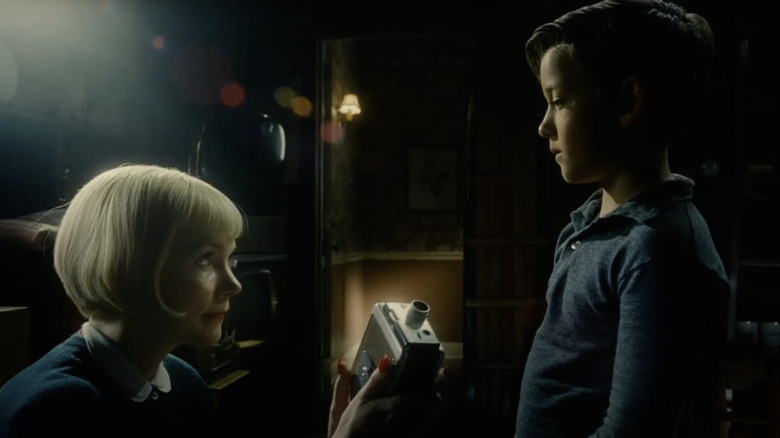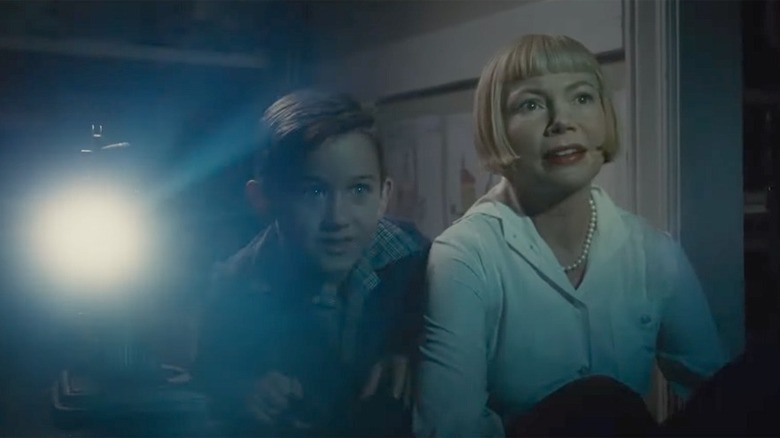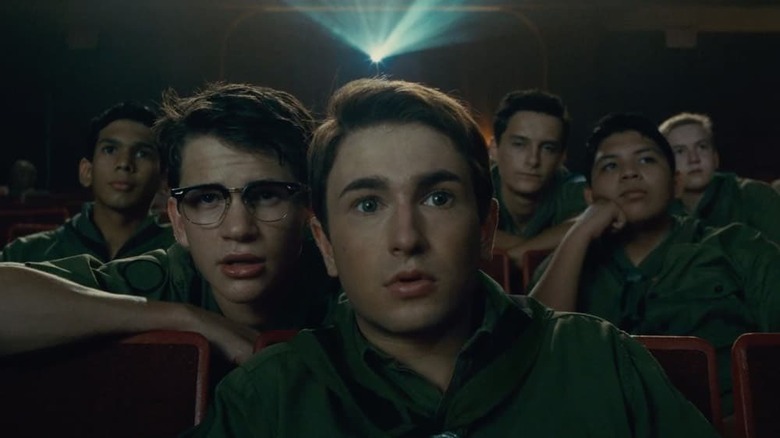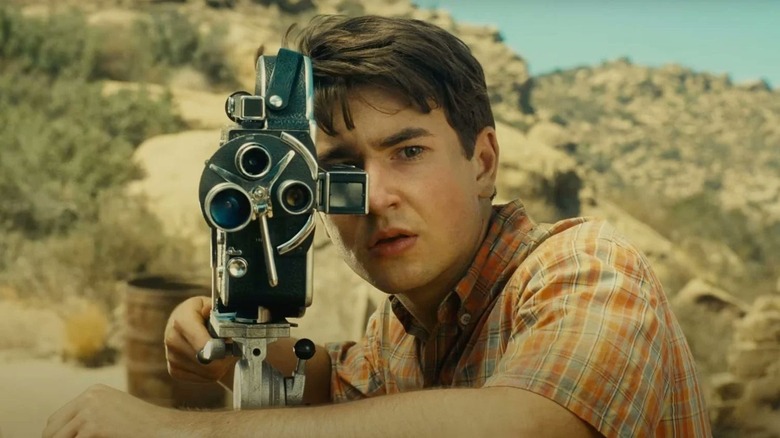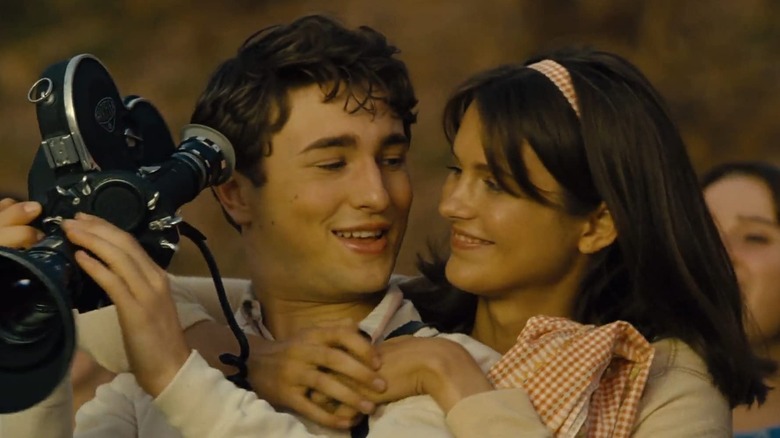How The Fabelmans Demystifies The Filmmaking Process, And Steven Spielberg Himself
Steven Spielberg is not just one of our greatest working directors, he's also a symbol of American culture. As part of the film school generation of filmmakers who reshaped Hollywood in the 1960s including Brian DePalma, Martin Scorsese, and Francis Ford Coppola, his success story from ambitious teenager to the inventor of the modern Hollywood blockbuster is evocative of the American Dream — an optimistic idea that talent and hard work alone will get one farther in life.
Though the director certainly has more than a few culture-defining masterpieces under his belt, his newest semi-autobiographical film "The Fabelmans" might just be his most personal creation yet. Extracted from the filmmaker's formative childhood memories and slightly fictionalized depictions of his family, it tells the tale of Sammy Fabelman (Gabriel LaBelle), his cinematic awakening, and the tension between his logic-minded father, Burt (Paul Dano), and his fellow dreamer mother, Mitzi (Michelle Williams).
I'd certainly argue "The Fabelmans" has much stronger aspirations, but the fact that it's a nearly 3-hour "love letter to cinema" from one of cinema's finest sentimentalists has led to some criticisms of over-indulgence. One particular argument that's been gaining steam lately is the idea that Spielberg is painting himself, through Sammy, as an inherently gifted individual that instinctively knows how to perfectly excel at the film he creates; that the motive and drive of the film is one of narcissism and self-celebration.
This could not be further from the truth. In fact, part of what makes "The Fabelmans" great is that it is deliberately demystifying the legend of Steven Spielberg. In his direct depiction of his childhood and his cinematic inspirations, Spielberg makes an argument that a filmmaker's strength lies in their perspective, not some impossible standard of perfection or originality.
'I need to see them crash!'
In the opening scene of "The Fabelmans," Steven Spielberg takes us back to where it all started: his very first film in a cinema, Cecil B. DeMille's 1952 film, "The Greatest Show on Earth." As an anxious little kid, young Sammy is too scared to go into the theater, and through Burt and Mitzi's different ways of comforting him, we're introduced to the right-brain and left-brain conflict that looms over his blossoming creative mind. Burt explains to Sammy the scientific concept of "persistence of vision," while Mitzi has a much more imaginative answer, "movies are dreams!"
After watching the train crash set piece, Sammy is forever fixated on that sequence of images. The car hurdling straight towards the train, the way it flips into the air after its collision, the specific shots and angles, and the sensation of the spectacle he feels but is unable to comprehend. He asks for a train set for Hanukkah, "I need to see them crash!" he tells his parents. Burt doesn't get it, but Mitzi does, secretly letting Sammy use his father's Super 8 camera to replicate the film's crash sequence with the train set.
This has left some viewers perplexed — how is he able to perfectly frame and edit the sequence as a 7-year-old who's never used a camera? It's simple really, he knows how to film the train crash because he's seen it before. Like any obsessive cinephile, Sammy has learned those images by heart, and though he created something unique and new out of his toy locomotive and the film camera, it was born from familiarity. This scene is crucial — it is Spielberg blatantly showing us the importance of homage.
Learning through homage and emulation
There is another, more immediately gratifying example of homage later in the film as well. As a teenage boy scout pursuing a badge in photography, Sammy makes short films with his local buddies and sisters. While watching "The Man Who Shot Liberty Valance" by John Ford, one of Sammy's friends asks him "what kind of movie are we going to make?"
Spielberg directly cuts from Lee Marvin's delivery of "stand and deliver!" to Sammy and his friends recreating the scene with their limited resources. Dirt clouds are thrown into the air to simulate carriage movement, "stand and deliver!" his actors echo. If the montage of him creating pictures growing up with his sisters is any further indication, while it's true Sammy shows moments of clever ingenuity, he's still an amateur with lots to learn, and he's not at all hiding from his inspirations.
This sequence, and by extension, all of the movie-making scenes in "The Fabelmans" are vital. Here is where Spielberg openly defines the kind of filmmaker he is — one that clearly wears his inspirations on his sleeve. His cinematic instincts don't come from some magical stroke of genius. Rather, he finds new techniques and skills through the act of replication and homage.
Whether it's an image in "Raiders of the Lost Ark" taken directly from his favorite film, "Lawrence of Arabia," or action set pieces that are highly reminiscent of the works of John Ford, Spielberg's career has been built on finding something new and exciting from the classics he emulates. "The Fabelmans" doesn't just acknowledge this vital stage of the creative process, it celebrates it.
Spielberg's brilliance is in his introspective power
In fact, I'd argue Steven Spielberg is arguing for the audience to look for something deeper and more important than the façade of "originality," for there's something much more important for a filmmaker to have. When Sammy creates his WWII picture, "Escape to Nowhere," he knows he's far from the first to make a WWII film. But, it's still important for him to get it right. "This is your war," he excitedly tells his father.
After discovering a family secret that could potentially change the balance of his home life, Sammy is distressed and channels his frustrations into the creation of his film. He explains to his lead actor the nuances of grief and loss his character is going through and makes himself cry — inadvertently spilling his guts about how he feels in his own domestic life. This is really the only place where Sammy can comprehend those emotions, on a film set, capturing his pain through 8mm film.
In just one scene, Spielberg perfectly captures what his entire body of work has been built on. Though living through a broken home is not the same as fighting a war, the urgency certainly feels the same. Sammy, and therefore, Spielberg, approaches all of his films with a sense of personal relatability that gives all of his movies an introspective, emotional power.
It's time to tell your own stories
In "The Fabelmans," Spielberg argues that perspective was his real gift all along. Not some stroke of inherited genius, not any sort of special technology he has access to, and not some original story that has never been done before. Honest storytelling and genuine filmmaking is built on the creator and their willingness to emotionally connect to the material as well as their confidence to proudly make something new from the familiar. True originality comes from the perspective the creator can bring to the material. There are plenty of sci-fi films about alien invasions, but how many of them used aliens as a backdrop to examine the nuances of domestic life?
In the last few moments of "The Fabelmans," in which Spielberg dramatizes the moment he met John Ford (David Lynch) at 17 years old, Sammy learns a nugget of wisdom from the eyepatched king of the Western:
"If the horizon's at the bottom, it's interesting. If it's at the top, it's interesting. If the horizon's at the middle of the frame, it's boring as s***!"
Sammy walks into the backlot, starstruck but full of rejuvenated hope in his career. In this moment, Sammy becomes much more than an avatar for Spielberg's teenage self. Spielberg colors the backlot in golden hour rays, John Williams's inspiring score kicks in, and the horizon of the frame moves from the middle to the bottom. Spielberg, even in this late stage of his career, is still openly learning with each film he creates. Through the advice John Ford once gave him, he hands what he's learned to the audience.
"The Fabelmans" is not a work of ego, it's an open invitation for all those who can identify themselves within Sammy to tell their own stories.
